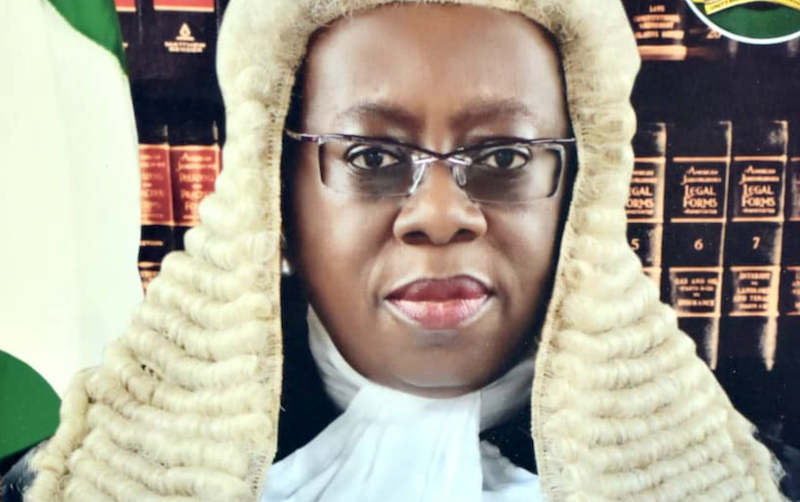Justice Kudirat Kekere-Ekun of the Supreme Court is set to become the next Chief Justice of Nigeria (CJN).
If she assumes the role, she will be the second female justice to hold this esteemed position after Mariam Aloma Mukhtar, who served as CJN from July 2012 to November 2014, a tenure of 28 months.
Justice Olukayode Ariwoola, the current CJN, will officially retire on Thursday, August 22, 2024, upon reaching the mandatory retirement age of 70 years.
As the most senior justice of the Supreme Court following Ariwoola, Justice Kekere-Ekun is the favored candidate to succeed him.
At 66 years old, Justice Kekere-Ekun could potentially serve up to four years, in contrast to the average two-year tenure of most of her predecessors. Her appointment will also make her the head of the National Judicial Council (NJC), which is responsible for overseeing the appointment, promotion, and discipline of judges across Nigeria.
Born on May 7, 1958, Justice Kekere-Ekun obtained her LL. B in 1980 from the University of Lagos and her LL.M from the London School of Economics and Political Science in November 1983.
She was called to the Nigerian Bar on July 10, 1981. From 1985 to 1989, she worked in private practice before being appointed Senior Magistrate Grade II in the Lagos State Judiciary in December 1989.
She became a judge of the High Court of Lagos State on July 19, 1996, and served as chairman of the Robbery and Firearms Tribunal, Zone II, Ikeja, Lagos, from November 1996 to May 1999.
Justice Kekere-Ekun was elevated to the Court of Appeal on September 22, 2004, serving in various divisions and presiding over two divisions (Makurdi and Aku) in 2011 and 2012, respectively.
She joined the Supreme Court of Nigeria as the fifth female justice and was sworn in on July 8, 2013.
Throughout her career, Justice Kekere-Ekun has attended numerous courses and seminars both within Nigeria and internationally, earning several merit awards. She is a life Bencher and a member of the International Association of Women Judges, where she serves as president.
The judiciary has faced significant challenges since Nigeria’s return to democratic rule in 1999. With Justice Kekere-Ekun assuming office soon, the succession process in the Supreme Court may be smooth for the first time in five years.
The last few CJNs have had controversial tenures. Justice Walter Onnoghen, who served from March 7, 2017, to January 25, 2019, left under accusations of asset declaration failures.
His successor, Justice Tanko Muhammad, who took office on January 25, 2019, resigned on June 27, 2022, amid allegations of unfair treatment from fellow justices, citing ill health.
The CJN is the head of the judiciary, presiding over the Supreme Court and the NJC. The president nominates the CJN upon the NJC’s recommendation, subject to Senate confirmation.
The CJN holds office until death or retirement at age 70, or can be impeached by the Senate with a supermajority vote.
In the last 15 years, seven CJNs have served, each averaging two years in office. This brief tenure has raised concerns among senior lawyers, who argue that such short terms are insufficient for meaningful judicial reforms.
However, others emphasize that the CJN’s office is regulated by law and is not a political position, suggesting that the judicial system operates under strict rules and cannot be driven by personal agendas.
As Justice Kekere-Ekun prepares to assume office, the expectation is that her leadership will bring stability and continuity to the Supreme Court and the broader Nigerian judiciary.
About Kudirat Motonmori Olatokunbo Kekere-Ekun CFR
Hon. Mr. Justice Kudirat Motonmori Olatokunbo KEKERE-EKUN CFR was born on May 7, 1958.
She obtained her LL.B in 1980 from the University of Lagos and LL.M from the London School of Economic and Political Science in November 1983. She was called to the Nigerian Bar on 10th July 1981.
She was appointed a Senior Magistrate Grade II, Lagos State Judiciary in December 1989. She was appointed as a Judge of the High Court of Lagos State in July 1996.
She served as Chairman Robbery and Firearms Tribunal, Zone II, Ikeja, Lagos from November 1996 to May 1999.
She was elevated as a Justice of the Court of Appeal on 22nd September 2004. She served as a member of the Court of Appeal ICT Committee from June 2011 to July 2013.
She has attended numerous courses and seminars within and outside Nigeria, such as Case Management and Court Administration Training Workshop Organized by the National Centre for State Courts in June 2001, ICT Training Course (Information Technology Infrastructure Library) in Dubai UAE in July 2012 and the 34th Cambridge International Symposium on Economic Crime, Cambridge, UK in September 2016.
She was appointed a Justice of Supreme Court of Nigeria on June 8, 2013.
She has delivered papers at various workshops, seminars and training workshops for magistrates and judges among which are “Delay in Election Tribunal Proceedings: Solutions” delivered at the All Nigerian Judges’’ Conference, Abuja between 16th – 20th November, 2009, “Law: A Tool for Social Change” delivered at the Nigerian Bar Association (NBA) Ibadan Branch Law Week on 30th November 2010, and “Stimulation and Sustenance of Economic Development through the Use of ADR Systems in the Judicial Process- Supreme Court Perspective” delivered at the 2015 ALL NIGERIAN JUDGES CONFERENCE, ABUJA on 25th November 2015.
She is a member of some notable clubs and Professional Associations, and has received several merit awards. She enjoys reading, music, information technology and counselling.
She is happily married with children.
